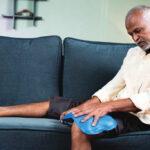(Reuters)—On April 27, Regeneron Pharmaceuticals Inc. and Sanofi SA said on Monday that their arthritis drug sarilumab (Kevzara) may only help the sickest patients with COVID-19, dampening hopes that the therapy could potentially reach a larger pool of patients with the disease.
The drugmakers said they would test high doses of sarilumab only in critically ill COVID-19 patients based on guidance from an independent committee that reviewed early trial data, which showed the drug was not beneficial for severe patients.
There are currently no approved treatments to treat the new coronavirus and drugmakers are rushing to repurpose existing drugs as well as test experimental therapies in infected patients.
Early analysis of the study showed that sarilumab rapidly lowered levels of C-reactive protein, a key marker of inflammation. However, the companies found negative trends for most outcomes in severe patients, while there were positive trends for all outcomes in the critical” group.
Patients who required mechanical ventilation or high-flow oxygenation or required treatment in an intensive care unit were considered critical, while those who required oxygen supply without mechanical or high-flow oxygenation were considered severe.
The mixed results raise concerns that sarilumab’s benefit in critical COVID-19 patients could be a spurious conclusion and may not indicate any real benefit by the therapy, says RBC Capital Markets analyst Kennen MacKay.
Sarilumab belongs to a class of drugs called interleukin (IL) 6 inhibitors that could help regulate an overreaction to the virus by the body’s immune system, which may be triggering the respiratory distress seen in severe COVID-19 cases.
However, a French study of Roche Holding AG’s IL-6 inhibitor tocilizumab (Actemra) found a significantly lower number of patients on the drug needed a ventilator or died, suggesting that the class of drugs may be beneficial, says Credit Suisse Analyst Evan Seigerman.
Regeneron has also identified hundreds of virus-neutralizing antibodies and is working to select the best two candidates for a cocktail therapy that may treat and even prevent the disease, with the expectation of starting human trials in June.
Regeneron’s shares, which have risen 51% so far this year, fell 4.6% to $540.41 in morning trading.
Reporting by Manas Mishra and Saumya Sibi Joseph in Bengaluru; Editing by Anil D’Silva and Ramakrishnan M


